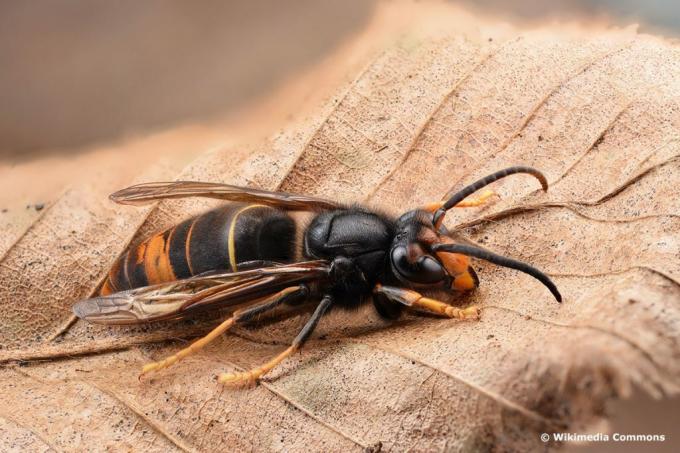
table of contents
- An intruder, not a guest
- Low occurrence
- Not a killer hornet
- frequently asked Questions
It is considered particularly dangerous and has now also been detected in Germany for the first time - the Asian hornet. Photos clearly show that the animals have arrived and apparently feel comfortable here.
In a nutshell
- Asian hornets are native to East and Southeast Asia
- up to five times larger than our bees, but mostly smaller than our native hornets
- Sting is described as particularly painful and in extreme cases can also kill a person
- In the Federal Republic of Germany their occurrence has so far been limited mainly to northern Germany
An intruder, not a guest
As is so often the case, it is the international trade in goods that brought the hornet to Europe and thus also to Germany. Even if it does not pose a major threat to humans, it is likely to be a problem for beekeepers in particular. They fear that the hornet species will become their enemy
Bees could develop. In addition to the dreaded Varoa mite and the agricultural use of pesticides, a new danger for bee colonies would lurk. The Asian hornet is therefore perceived by beekeepers as an intruder and not as a guest. It is considered an invasive species throughout Europe.Note: Even if it is an invasive species, the animals must not be killed without further ado. It is best to consult with the lower nature conservation authority, which is usually located at the district offices.
Low occurrence
According to the Canadian entomologist John Swann, the Asian hornet is no more dangerous than our native western hornet species. If they do not feel threatened, the animals behave largely peaceful and are not aggressive. However, if you get too close to their nest, they can quickly attack. So far only a very small population of the Asian hornet has been discovered in Germany. It is currently spreading primarily in northern Germany. It is assumed that the proximity to the large container ports in Hamburg and Bremerhaven is the reason for this. The hornet species is likely to have come to us by sea as a stowaway in containers.

Not a killer hornet
A distinction must be made between the Asian giant hornet (Vespa Mandarina) and the Asian hornet (Vespa Veluntina) among the Asian hornets. While the former is often qualified as a killer hornet, the latter is largely harmless - as long as you don't feel threatened. All hornets always feel threatened when a person comes too close to their offspring in the nest. Asiatic hornets build their nests in the treetops with a certain preference. It is mostly a paper-like, misshapen structure that tends to be brown in appearance, which:
- hangs relatively freely on a larger branch
- is constantly buzzing around with many adult hornets
- has a clear opening into its interior at the bottom
- frequently changes its shape and size due to permanent additions
Note: Especially when harvesting fruit trees, there is a risk of getting too close to a possible nest. Therefore, an intensive visual inspection from the ground is recommended before harvest.
frequently asked Questions
Asian hornets are very similar to our native species. The easiest way to distinguish between them is their respective size. As a rule, the Asian insects are much smaller than their European counterparts. However, this does not apply to the Asian giant hornet, which has not yet been proven in this country.
A healthy person will feel relatively severe pain from the hornet sting, but otherwise will not suffer any damage to health. A single prick may cause anaphylactic shock, but is otherwise harmless. The situation is different, however, if several stings occur at the same time, i.e. you are attacked by several hornets. Depending on the disposition, there can then be mortal danger.
One has to assume that. In any case, this species is already very widespread in North America and causes great damage to the bee colonies every year. There is a great danger that the giant hornet will also be brought in by sea and that we will have experiences with the animals similar to those of the Americans.
You should definitely not want to remove it yourself, but rather hire an exterminator to do it. They usually know exactly how to proceed and which protective measures are necessary.



